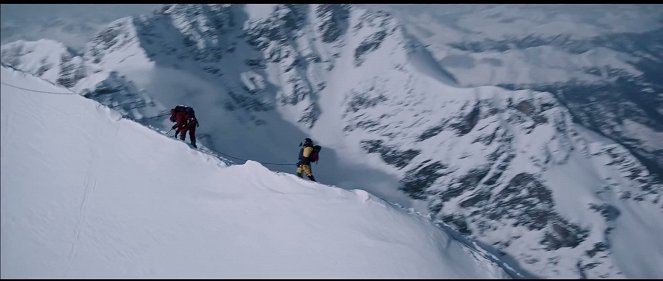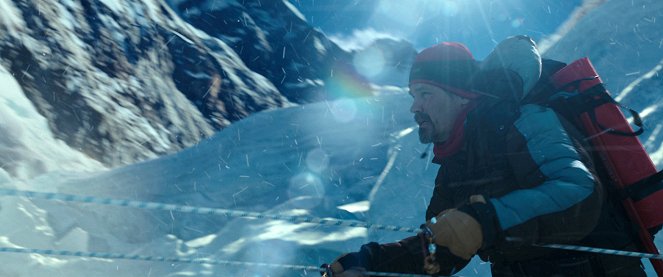Directed by:
Baltasar KormákurCinematography:
Salvatore TotinoComposer:
Dario MarianelliCast:
Jason Clarke, Jake Gyllenhaal, Josh Brolin, John Hawkes, Sam Worthington, Robin Wright, Michael Kelly, Keira Knightley, Emily Watson, Thomas M. Wright (more)VOD (4)
Plots(1)
Expert mountaineers Rob Hall (Jason Clarke) and Scott Fischer (Jake Gyllenhaal) lead rival expeditions to scale the highest peak on Earth, Mount Everest. Their quest becomes dangerous when the fearless climbers collide head-on with one of the fercest blizzards in the mountain’s history. Faced against impossible conditions, the limits of human spirit and physical endurance are put to the ultimate test in an epic struggle for survival in this chilling, edge-of-your-seat thriller based on actual events. (Universal Pictures UK)
(more)Videos (25)
Reviews (18)
Raw and majestic. Where most people would have long since given up mountain climbing, Kormákur has no trouble in handling the dramatic plane, but he also has the enthusiasm to climb to the top of the world. The central story itself is very powerful, but the down-to-earth approach that removes any possible pathos forces you to value it all the more. Deaths are ordinary, without tension build-up and so have greater impact. Great acting performances. Worthington at last has a proper role, but not major. Keira will tempt moisture from your eye. Beautiful music.
()
Everyone you develop a fondness for gets in big trouble. That is Everest’s only dramaturgical ambition. An IMAX
marketing product that uses only half of the IMAX screen with its widescreen format. The script is purely average
without any memorable dialogue, moments or characters. The excellent international cast has practically nothing to do,
and Jake Gyllenhaal’s character, which we looked forward to most, gets only about three times more space than in the
trailer. However, the visuals are nice and the Everest environment authentic, and the footage of the famous passage
below the Hillary step is impressive. The key weapon in the film’s arsenal is the intensity of the whirlwind, which shoves
you back in your seat in a cinema with a high-quality sound system (such as Dolby Atmos). Commendably, the film does
not embellish reality, avoids pathos and is not dragged down by its own stupidity (Vertical Limit). But all of this is also
true of Nordwand, which is not a rushed studio hit but, with narrative enthusiasm and interest in the characters,
describes a historically more significant and dramatic climb on the Swiss Eiger (which is a completely different level of climbing than the “walk” up Everest).
()
The journey to a place where the human body dies, in the story of people who knew very well how much they were risking, but still went for it. Nothing more, but certainly nothing less. And even though I don't understand the self-destructive behavior of the main heroes, thanks to the brilliant cast, I feel like I have at least glimpsed beyond the first summit. The intensity with which the highest mountain in the world siccs its pitfalls on climbers nails you to your seat, and the moment a storm appears, the cinema is already shaken to the core and the viewer knows they are in for a rough ride. And every gasp for breath almost hurts in your own lungs.
()
It is not an adaptation of Krakauer's well-known original "about the event", which will surprise many in a bad way. And it is even more surprising that it lacks any significant ambitions with regard to the creator and the cast. From the whole expedition we only get to know a trio "Hall - Texas guy - postman" properly. What is a biggest disappointment is that given that the disproportionately more interesting trio "Krakauer - Yasuko - Fischer" is clearly only a makeweight here (not to mention the other participants who are present only out of duty "because they were also there at the time" rather than playing a more significant role in the movie. The same goes for Sherpas. Likewise, what is completely ignored are the controversial topics surrounding Hall's and his company's involvement in this disaster “we get the people to the top even though they cannot make it". They failed to make proper preparation, and even at the top they made a bunch of incomprehensible decisions. The movie completely avoids any dark undertones what a person is capable of when things go wrong. And the fate of the three Indians who were caught by surprise by the same storm is not even mentioned. So, these are the weak points what this movie is not and what it is not about. What is more important is, however, what the movie is at the end of the day. And it's a damn successful manly adventure movie with Hollywood-style human warming emotions about the invincibility of the human spirit and with heartbreaking phone calls to the pregnant wife. Once you get it and understand that the main role is not played by the actors, but by the truly impressive camera (by the way, it was made in 3D after years again, which is not just a way to increase the ticket price, but an integral part of the experience; especially when watched in IMAX), showing the beauty of the Himalayas that will intoxicate you, you will really enjoy it. That is for sure. Yes, it's surprisingly cold not only in terms of atmosphere but also in terms for emotions and the first half is better than the second half that describes tragedy, but it doesn't matter that much, because it's still quite impressive and very intense, which is undoubtedly the best non-documentary climbing film of the last few years along with German Nordwand.
()
The filmmakers’ indecisiveness about which of the roughly six more significant characters would be the main protagonist probably stems in part from the fact that they relied on the memories of all of the survivors and their loved ones in an attempt at a comprehensive view of the tragedy instead of relying on a single source (Krakauer’s book, which had already been made into the television movie Into Thin Air: Death on Everest, would have served the purpose). No time or space remains for the more thorough development of the characters, who comprise merely a few types; usually the more interesting they are, the more charismatic the actor playing them (the cocky Texan, the easy-going American mountain guide, the responsible New Zealand mountain guide, the humble mailman who wants to fulfil his dream, the loving and caring women). Despite the faint outlining of the characters, the first hour of the film is important, as that is when, in addition to the dangers that await them, we are presented with the relationships between the characters and their ambitions and motivations. We thus better remember their names and later, despite the layer of frozen snow and the dark glasses on their faces, we can recognise who is shouting at whom. At the same time, the fatal decisions that some of the characters make (the bond between Rob and Doug) are more understandable and we are also better able to find our bearings in the individual sections of the journey to the summit, which are presented to us in advance. Whereas the formula of a disaster film is fulfilled by spreading attention among multiple characters, the disaster itself does not serve as punishment for the sins committed by the immoral characters. Atypically, perhaps out of respect for the victims, this is a drama about a group of good people who try to help other good people (The Martian will probably offer a similar story soon). There is no enemy to be defeated, nor is there a character who is supposed to see the light and undergo a transformation based on experience (if he had been a bit more inattentive toward his wife, Beck could have fulfilled this pattern of development). The will to survive is crucial. There is something similarly and likably old-world about the idea of “we have to help each other” as there is about the strictly linear narrative with no flashbacks and with a single (inappropriate) dream sequence. All of the information conveyed, which seems needless on the surface, is put to good use by Kormákur in the film’s second, extremely intense half with astonishing momentum (literally in places) and only a few sentimental moments (though the narrative is structured around them – see the storyline with the unborn child – so they are not superfluous). It serves no purpose to confront the protagonists with the question that will probably occur to every viewer who is not a mountain climber – why do they do it? After all, the rules of the game are not set by people in the second half, but by nature. In the spirit of the cinema of attractions (not intellectual), the aim is to provide an immediate visceral experience. In hindsight, I realise that’s not much. Immediately after the screening (IMAX 3D), however, with the subsiding feeling that I had just descended from the summit of the world’s tallest mountain, I found that I could not have wanted anything more. 75%
()
(less)
(more)



Ads